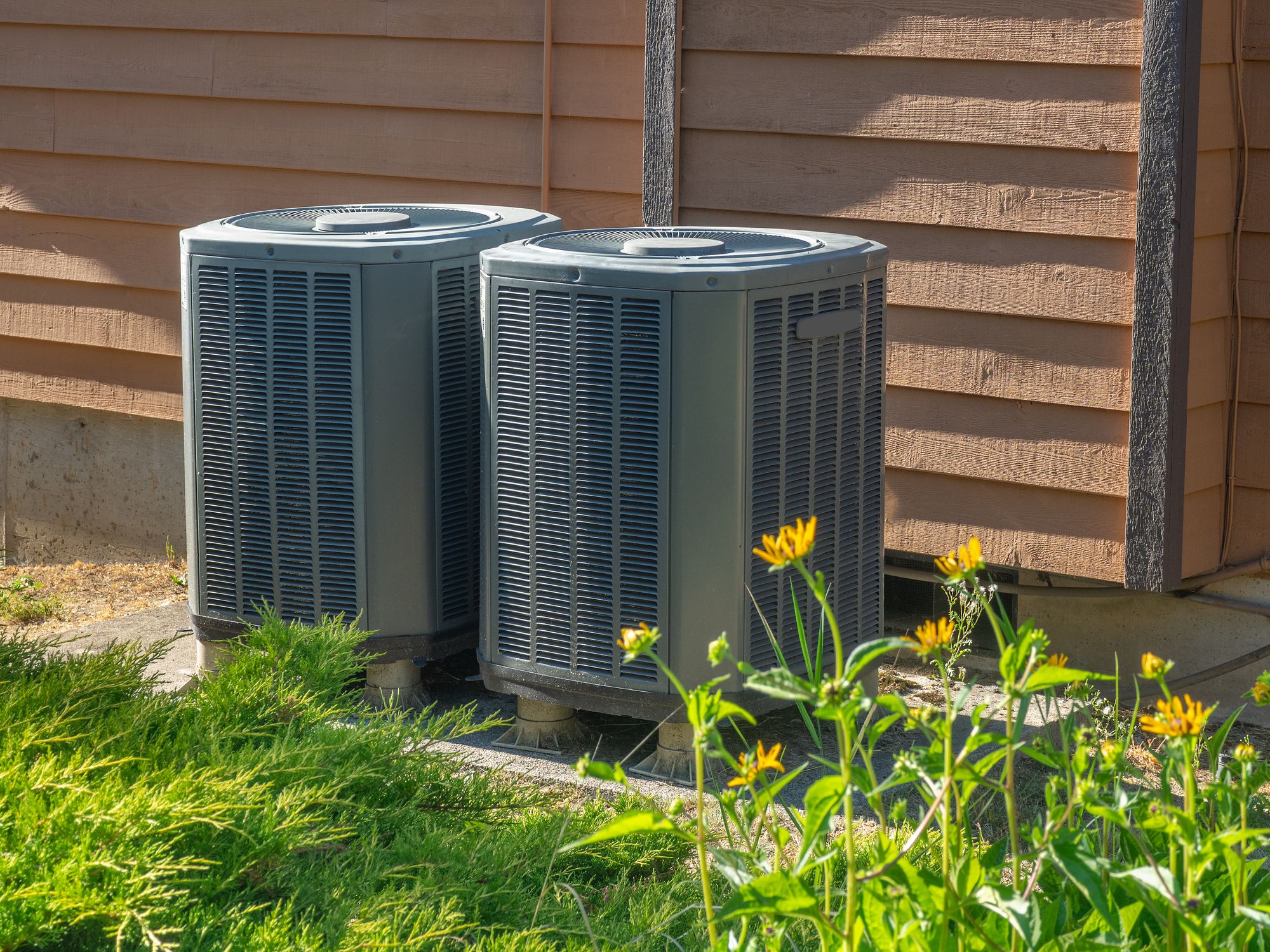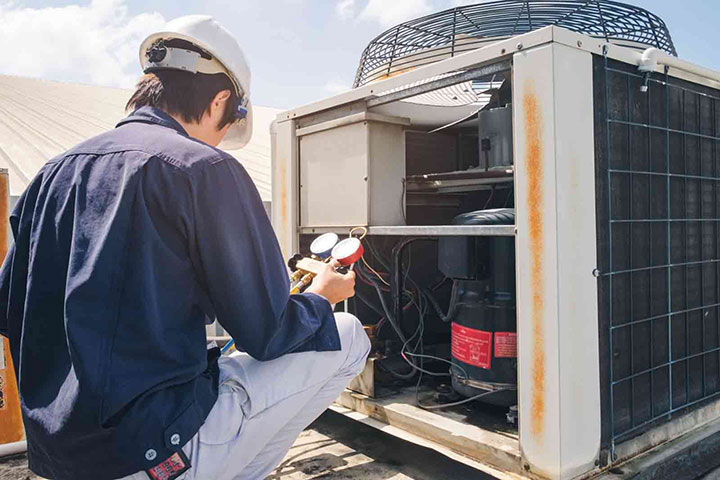Discovering the Vital Components of an Effective Cooling And Heating System
An effective heating and cooling system is constructed on a number of vital parts that function in harmony. Each part, from the thermostat to the ductwork, plays a vital role in preserving comfort and power performance. Recognizing these aspects is vital for enhancing efficiency and enhancing indoor air quality. As one analyzes these elements, the intricate partnerships between them disclose insights into boosting overall system performance. What particular variables contribute most to this performance?
The Duty of the Thermostat in HVAC Performance

Although often neglected, the thermostat plays a critical duty in the performance of HVAC systems. HVAC experts. This tiny tool serves as the primary control center, managing temperature setups and guaranteeing suitable comfort within an area. By properly noticing the ambient temperature, the thermostat interacts with the home heating, air, and ventilation conditioning units to keep the desired environment
An effective thermostat lessens power usage by activating the HVAC system just when required, therefore avoiding extreme home heating or air conditioning. Modern programmable and smart thermostats enhance this efficiency better by permitting users to establish schedules and remotely change setups, adapting to day-to-day regimens.
The placement of the thermostat is crucial; improper place can lead to imprecise temperature analyses, resulting in inefficient operation. Generally, a well-functioning thermostat not just enhances convenience but also contributes noticeably to energy savings and the longevity of the heating and cooling system.
Comprehending the Importance of Air Filters
Air filters offer an essential function in cooling and heating systems by ensuring that the air circulating within a space remains tidy and healthy and balanced. These filters trap dust, irritants, and various other contaminants, avoiding them from being recirculated throughout the environment. By catching these particles, air filters contribute to improved interior air high quality, which can substantially profit occupants' wellness, especially those with allergic reactions or respiratory system conditions.
Additionally, preserving clean air filters boosts the effectiveness of HVAC systems. Clogged up filters can restrict air movement, causing the system to function more challenging to preserve desired temperatures, bring about raised energy consumption and greater energy bills. On a regular basis changing or cleaning filters is an essential upkeep step that can lengthen the life-span of cooling and heating devices. Ultimately, recognizing the relevance of air filters permits property owners and structure managers to take positive steps to assure a well-functioning, effective HVAC system that promotes a comfy and risk-free indoor environment.

The Capability of the Heater and Heat Pump
Furnaces and heatpump are essential parts of heating and cooling systems, liable for giving heat throughout cooler months. Furnaces operate by heating air through combustion or electrical resistance, then dispersing it throughout the home using ducts. They usually offer fast home heating and can be fueled by gas, power, or oil, depending upon the system kind.
Alternatively, heat pumps transfer warm instead of produce it. They remove warm from the outside air or ground, even in reduced temperature levels, and move it inside. HVAC experts. This double performance enables heatpump to additionally offer cooling in warmer months, making them flexible options for year-round climate control
Both systems call for correct upkeep to assure performance and long life. While furnaces master severe chilly, heatpump can be helpful in modest climates. Comprehending their distinct capabilities aids homeowners in selecting the most ideal option for their home heating needs.
Discovering the Air Conditioning Device
The air conditioning unit is a crucial component of a/c systems, available in different types to match different needs. Understanding the performance rankings of these systems is important for making informed options about energy intake and cost. This area will certainly explore the varied kinds of air conditioning system and make clear exactly how efficiency scores influence efficiency.
Kinds Of Air Conditioners
While various aspects influence the selection of cooling systems, understanding the various types offered is vital for property owners and building managers alike. Central air conditioning conditioners are designed to cool entire homes or structures, making use of a network of air ducts for air flow. Home window devices use a more localized service, suitable for tiny rooms or single areas. Mobile air conditioning system supply versatility, allowing users to move the system as required. Ductless mini-split systems are one more option, combining the performance of central systems with the comfort of zoning, as they call for no ductwork. Geothermal systems harness the planet's temperature level for energy-efficient cooling. Each type features distinct benefits, making informed selections necessary for effective climate control.

Efficiency Rankings Described
Recognizing efficiency rankings is necessary for picking the right cooling device, as these metrics give insight right into the system's efficiency and power intake. One of the most usual rating for air conditioners is the Seasonal Energy Efficiency Proportion (SEER), which gauges the cooling result during a typical air conditioning period separated by the total electrical energy input. A greater SEER indicates better performance. Additionally, the Power Effectiveness Proportion (EER) is made use of for gauging performance under details conditions. Another crucial metric is the Energy Celebrity accreditation, which signifies that an unit fulfills strict energy performance guidelines. By evaluating these ratings, consumers can make informed choices that not just enhance comfort but also reduce energy costs and ecological effect.
The Importance of Ductwork and Air flow
Efficient ductwork design and airflow management play crucial functions in the general performance and efficiency of a/c systems. Appropriate ductwork guarantees that conditioned air is dispersed uniformly throughout a room, decreasing temperature changes and improving convenience. Properly designed ducts reduce resistance to air movement, minimizing the work on cooling and heating devices and inevitably reducing power usage.
Air movement administration entails tactically putting vents and signs up to improve the circulation of air. This avoids usual problems such as hot or chilly areas, which can occur when airflow is obstructed or inadequately balanced. Furthermore, the ideal duct materials and insulation can better enhance efficiency by decreasing warmth loss or gain during air transportation.
An efficient ductwork system not just adds to energy financial savings but can likewise prolong the life expectancy of a/c devices by lowering unneeded pressure (HVAC experts). Subsequently, understanding the relevance of ductwork and airflow is important for accomplishing peak a/c system performance
Routine Upkeep Practices to Boost Performance
Regular upkeep techniques are crucial for making certain peak performance of heating and cooling systems. These methods include routine evaluations, cleaning, and essential repair services to keep the system running effectively. On a regular basis changing air filters is vital, as blocked filters can obstruct air movement and minimize effectiveness. On top of that, service technicians should examine and clean evaporator and condenser coils to stop getting too hot and energy wastefulness.
Annual professional evaluations are likewise suggested, as qualified technicians can determine possible concerns before they rise. Oiling relocating components lessens deterioration, adding to a much longer lifespan for the system. Moreover, making certain that the thermostat operates properly aids in preserving perfect temperature level control.

Regularly Asked Questions
Exactly how Often Should I Replace My Thermostat?
Thermostats ought to usually be replaced every 5 to ten years, depending upon use and innovation improvements. Routine checks are a good idea to guarantee peak performance, particularly if experiencing inconsistent temperature control or enhanced power prices.
What Dimension Air Filter Is Finest for My Cooling And Heating System?
The best dimension air filter for a heating and cooling system differs by system design. Usually, it's important to consult the proprietor's handbook or examine the existing filter dimensions to guarantee peak performance and air quality.
Can I Set Up a Warm Pump Myself?
Setting up a heatpump here individually is feasible for proficient people, yet it calls for knowledge of neighborhood codes and electric systems. Hiring a professional is suggested to guarantee appropriate installment and optimal system performance.
How Do I Know if My Ductwork Is Reliable?
To figure out ductwork efficiency, one should inspect for leakages, procedure air flow at vents, check insulation high quality, and evaluate temperature distinctions in between supply and return ducts. Specialist evaluations can offer detailed insights right into overall performance.
What Are Signs My HVAC Requirements Immediate Upkeep?
Indications that an a/c system requires prompt maintenance consist of unusual sounds, irregular temperature levels, increased energy expenses, unpleasant smells, and regular biking. Addressing these issues quickly can prevent more damages and warranty peak system performance.
Air filters serve a vital feature in Cooling and heating systems by ensuring that the air distributing within an area stays healthy and balanced and tidy. Furthermore, maintaining tidy air filters improves the performance of Heating and cooling systems. Ductless mini-split systems are another alternative, integrating the efficiency of main systems with the convenience of zoning, as they require no ductwork. Understanding performance scores is crucial for choosing the appropriate air conditioning device, as these metrics provide understanding right into the system's efficiency and energy intake. The best size air filter for an A/c system differs by system design.